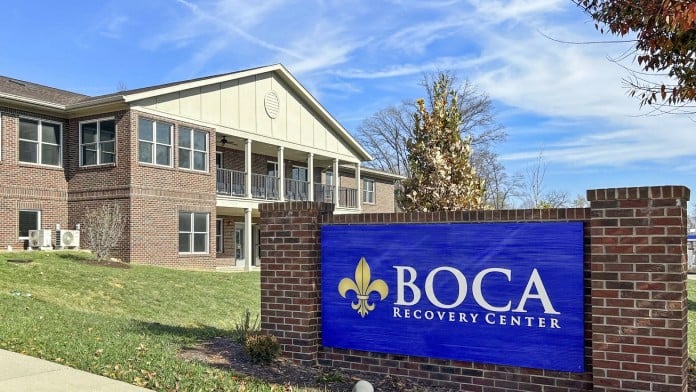About Boca Recovery Center – Bloomington Alcohol & Drug Rehab
One unique part of this alcohol and drug rehab in Indiana is the peaceful, secluded setting. If recovering in a clinical hospital setting doesn’t sound very appealing, you’ll appreciate the five acres of rolling green countryside that surround you here. Your treatment will include a mix of therapy, relaxation and recreation to help heal your mind, body and spirit.
One thing I like about the program is that no two treatment plans are the same. Your providers will create a custom approach that meets your specific needs and helps you reach your recovery goals. Some of their available services include individual and group counseling, medication assisted treatment and dual dual diagnosis care. If you need to go through medical detox before you start your recovery, they’ll help you take care of that step on site.
When you’re ready to exit the inpatient program, you can still visit the facility for outpatient counseling services. These programs usually require a few hours of therapy each week and allow you to return home between sessions.
Facility Overview
Latest Reviews
See AllThank you for your heartfelt review! We’re thrilled to hear about your positive experience at Boca Recovery Center Bloomington, Indiana. Our dedicated staff, including our amazing technicians, are committed to providing compassionate and evidence-based care to support individuals throughout Monroe County and South-Central Indiana. We’re always here whenever you or someone you know needs support as you continue your journey toward long-term recovery.
Best regards,
The Boca Recovery Center Team
Rehab Score
Gallery
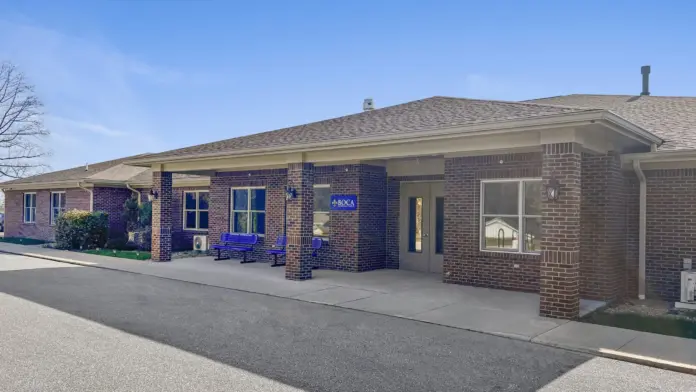
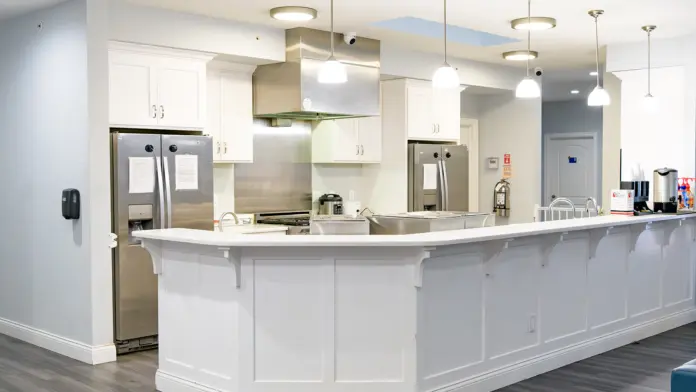
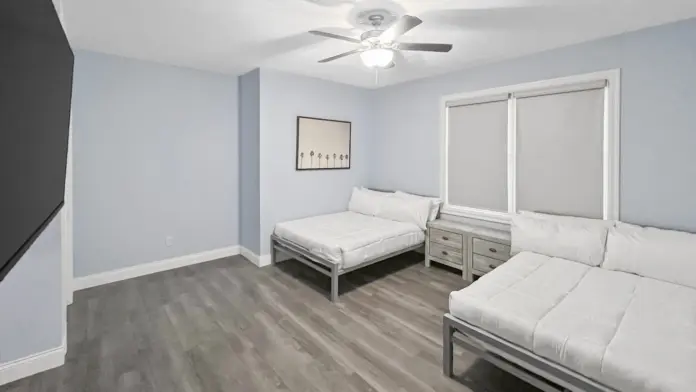
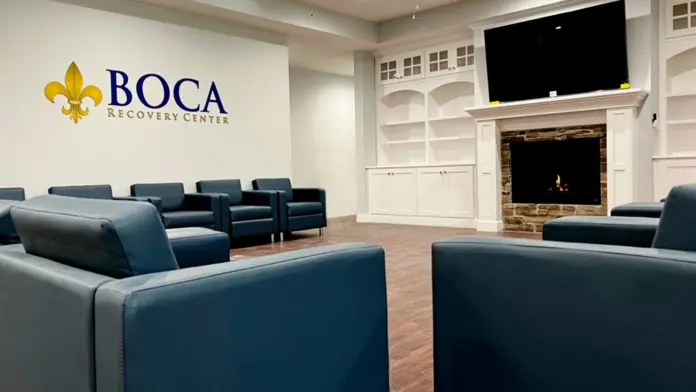
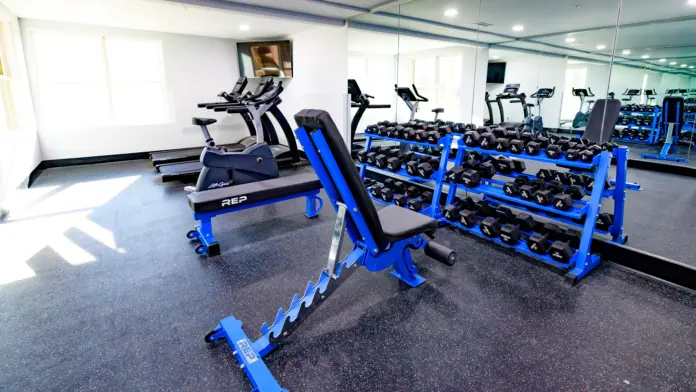
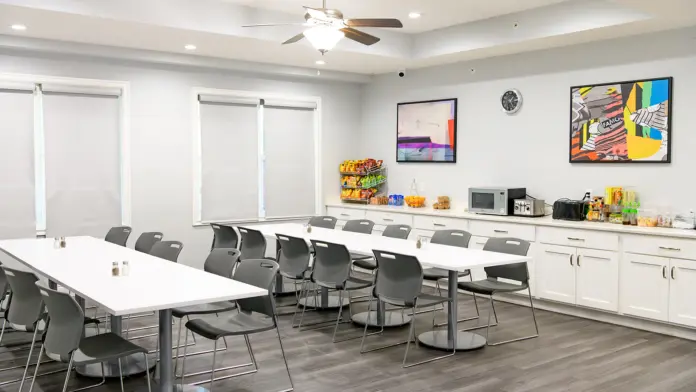

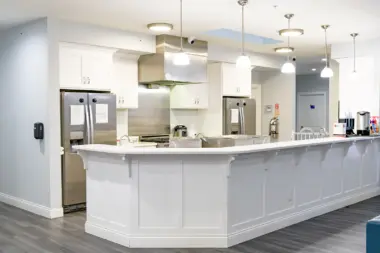
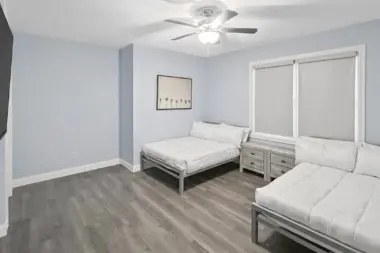
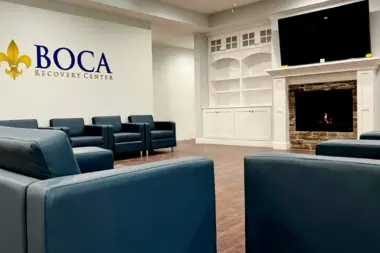

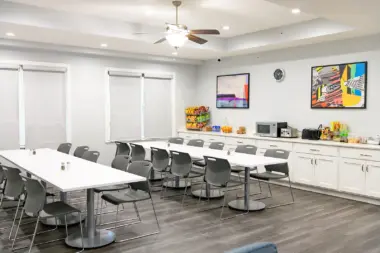
Accepted Insurance












Other Forms of Payment
Private insurance refers to any kind of healthcare coverage that isn't from the state or federal government. This includes individual and family plans offered by an employer or purchased from the Insurance Marketplace. Every plan will have different requirements and out of pocket costs so be sure to get the full details before you start treatment.
Self-pay involves paying for treatment out of your own pocket. You can use savings or credit, get a personal loan, or receive help from family and friends to fund your treatment. If you don't have insurance or your insurance plan doesn't cover a specific program, self-pay can help ensure you still get the care you need.
Military members, veterans, and eligible dependents have access to specific insurance programs that help them get the care they need. TRICARE and VA insurance can help you access low cost or no cost addiction and mental health treatment. Programs that accept military insurance often have targeted treatment focused on the unique challenges military members, veterans, and their families face.
Financial aid can take many forms. Centers may have grants or scholarships available to clients who meet eligibility requirements. Programs that receive SAMHSA grants may have financial aid available for those who need treatment as well. Grants and scholarships can help you pai for treatment without having to repay.
Addiction Treatments
Levels of Care
Our outpatient program at Boca Recovery Bloomington offers flexibility for people who want treatment but may have work, school or family commitments that inpatient treatment cannot accommodate. We offer individual, group and family therapy, psychoeducation and skills training that focuses on relapse prevention. Outpatient treatment may last for an extended period depending on your unique needs.
Inpatient treatment provides the most structure and support for individuals with alcohol or substance use disorders. Our addictions team will work with you to create your own unique treatment plan to help you achieve long term sobriety. Our program includes individual and group counseling, holistic therapy and nutritional counseling.
Our intensive outpatient program at Boca Recovery Center in Bloomington provides intensive treatment with a flexible schedule. You can expect to attend nine to 20 hours each week in programming. Our addictions professionals utilize the best evidence based practices to create personalized treatment plans that include counseling, MAT when necessary, education and skill building exercises.
A partial hospitalization program (PHP) can provide intensive rehab on a short-term basis. While PHP treatment typically requires a commute, telehealth may be available. PHP treatment costs can vary but are often covered by most insurance. The program duration can vary to meet your specific needs and require you to meet for a minimum of 20 hours a week for an average of 90 days. PHP Treatment services often include relapse prevention strategies, medication management, individual and group counseling, and other behavioral therapy interventions.
When removing addictive substances from your body under the care of licensed medical professionals, the process is called medically assisted detox. Once you’ve become physically dependent on substances like alcohol, opioids, or benzodiazepines, quitting can be uncomfortable or even dangerous. To minimize risks to your health and overall discomfort, a team of medical professionals monitors you 24/7 and provides medications if necessary (like Suboxone or methadone) to ease potential symptoms of withdrawal.
Recovery requires lifelong work and commitment. Our aftercare program offers you continued support on your recovery journey, once inpatient or outpatient treatment at Boca is complete. This may include continued individual or group therapy, long term MAT maintenance, support groups or sober living activities for you and your loved ones.
Programs like Alcoholics Anonymous (AA) or Narcotics Anonymous (NA) are 12 step programs that help men and women who are experiencing alcohol or substance use disorder in their recovery journey. These 12 step programs are available for Boca clients who are interested in this type of treatment option.
Sober living homes are available for individuals who have completed residential rehab but still need a supportive and sober environment to reside in. These programs help with the transition from the structure of residential treatment to more independent living while you’re on the road to recovery and reintegrating into the community.
An intervention is an organized and purposeful attempt to help individuals with alcohol or substance use disorders get the treatment they need. These generally arise due to concerns from family or support persons who have recognized the destructive behaviors that their loved ones are exhibiting as a result of their drinking or substance use.
24 hour clinical care is provided for individuals who are in the earliest stages of recovery, especially those who require medical detox from substances such as alcohol, opioids, some stimulants and benzodiazepines. We monitor for complications related to withdrawal, provide care to make the process as comfortable as possible and intervene when an individual’s health condition warrants.
Treatments
Drug addiction is a disorder that affects an estimated 21 million Americans. At Boca Recovery Center, our addiction professionals are here to help you learn to manage your condition by using the latest evidence based therapies so you can regain control over your life.
Alcoholism is one of the most common substance use disorders and severely impacts both emotional and physical health. Here at Boca, we offer medical detox from alcohol abuse using FDA approved medications to ease withdrawal symptoms and stabilize your physical health.
Opioid addiction is recognized as one of this country’s biggest health crises. The use of opioids has a tremendous impact on the brain by impacting our dopamine receptors. We understand that recovery starts with medical detox, so our addictions team is here to help you navigate the early stages of recovery in a safe and comfortable environment.
Dual diagnosis refers to experiencing co-occurring mental health conditions such as anxiety, depression or PTSD while also experiencing alcohol or substance use disorder. At Boca Bloomington, we will address these conditions when creating your individualized treatment plans to support you and your long-term recovery journey.
Mental health and substance abuse are often co-occurring concerns. Our addictions team will help you identify and manage triggers that impact your mental health which is often one of the reasons people misuse alcohol or drugs. Your customized treatment plan will address these issues and help you set a path for a healthier future.
Indiana provides substance abuse treatment programs for individuals with substance use disorders. With a range of care levels, including outpatient, inpatient, and partial hospitalization programs, you'll be able to find the right treatment for you. Programs usually include a substance abuse evaluation, evidence-based therapies such as cognitive-behavioral therapy (CBT), dialectical behavior therapy (DBT), and group therapy address substance abuse and enhance coping strategies. By offering personalized treatment plans and a supportive environment, these programs strengthen your ability to maintain your recovery.
Programs
Our adult alcohol and substance abuse programs are tailored to address the specific needs of adult clients. This may include the need for flexibility in schedules, understanding that goals often differ from one individual to another, and that relationships play a huge role in the recovery process. Residential, outpatient and aftercare programs are the first steps toward a lifetime of sobriety.
Young adult alcohol and substance use disorder programs understand that people in this age group have unique needs related to addiction and work, school or relationships. These programs include activities that promote peer support and allow individuals to develop healthy coping skills.
Nearly one million adults age 65 and older live with a substance use disorder. Treatment providers who specialize in senior care understand the social, psychological, and physical effects of aging and how they relate to recovery. They can help clients address particular challenges and risks they may face as they get older such as overdosing and medication interactions and dependencies.
Recovery is most successful when clients feel accepted and validated by their peers and treatment providers. Facilities that offer LGBTQ-inclusive programming are committed to creating a safe space where everyone can grow and recover without fear of judgment or discrimination. They will have dedicated policies in place to create a safe and supportive environment that fosters free expression.
Serving in the military is both mentally and physically challenging, and can result in trauma that persists even after combat ends. Military programs are tailored to the specific and often complex needs of active duty personnel, veterans, and military families. Clients often access these programs through the U.S. Department of Veterans Affairs (VA).
Clinical Services
Cognitive Behavioral Therapy (CBT) is a therapy modality that focuses on the relationship between one's thoughts, feelings, and behaviors. It is used to establish and allow for healthy responses to thoughts and feelings (instead of unhealthy responses, like using drugs or alcohol). CBT has been proven effective for recovering addicts of all kinds, and is used to strengthen a patient's own self-awareness and ability to self-regulate. CBT allows individuals to monitor their own emotional state, become more adept at communicating with others, and manage stress without needing to engage in substance abuse.
Dialectical Behavior Therapy (DBT) is a modified form of Cognitive Behavioral Therapy (CBT), a treatment designed to help people understand and ultimately affect the relationship between their thoughts, feelings, and behaviors. DBT is often used for individuals who struggle with self-harm behaviors, such as self-mutilation (cutting) and suicidal thoughts, urges, or attempts. It has been proven clinically effective for those who struggle with out-of-control emotions and mental health illnesses like Borderline Personality Disorder.
Trauma therapy addresses traumatic incidents from a client's past that are likely affecting their present-day experience. Trauma is often one of the primary triggers and potential causes of addiction, and can stem from child sexual abuse, domestic violence, having a parent with a mental illness, losing one or both parents at a young age, teenage or adult sexual assault, or any number of other factors. The purpose of trauma therapy is to allow a patient to process trauma and move through and past it, with the help of trained and compassionate mental health professionals.
Research clearly demonstrates that recovery is far more successful and sustainable when loved ones like family members participate in rehab and substance abuse treatment. Genetic factors may be at play when it comes to drug and alcohol addiction, as well as mental health issues. Family dynamics often play a critical role in addiction triggers, and if properly educated, family members can be a strong source of support when it comes to rehabilitation.
Group therapy provides a unique experience for men and women to encounter a supportive environment where you can share your experiences and gain insight from your peers who understand your struggles. Group therapy improves your journey and helps promote sustainable recovery.
Qualified therapists in Indiana use a customized treatment approach for individual therapy to address your drug and alcohol addiction treatment. This considers your past history and life circumstances to help you uncover the underlying issues that trigger addictive behavior and manage these factors to support a healthy approach to recovery.
Motivational interviewing aims to stimulate the client’s personal motivation and commitment to change. Rather than receive advice and warnings from the therapist, the client is given the opportunity to share their concerns and reach their own conclusions.
In couples therapy, you and your partner work with a psychologist to identify challenges in the relationship and what changes need to be made. You’ll work on listening, communicating, and navigating those changes in healthy ways.
Life skills include cognitive skills, interpersonal skills, and personal skills that help you manage daily living. Cultivating these skills during rehab in Indiana is an important part of recovery. With these skills, you’ll be able to navigate challenges and prevent relapse.
Feelings of withdrawal and intense cigarette cravings make quitting smoking difficult. Nicotine replacement therapy can double your chances of long term success. This therapy provides a small amount of nicotine, so you can slowly wean yourself off this addictive substance.
To function properly, your body must have nutritional balance. Addiction throws off this balance by depleting your body of essential nutrients. Nutrition therapy aims to restore this balance by providing a healthy diet that supports healing and long term sobriety.
Amenities
-
Private Setting
-
Residential Setting
-
Yoga Studio
-
Gym
-
Luxury Accommodations
-
Private Rooms
Staff & Accreditations
Staff
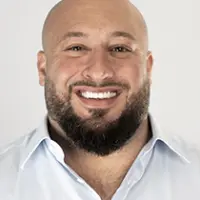
Christopher Ferry
CEO
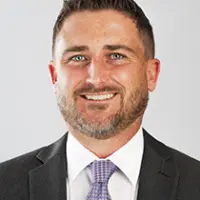
Justin Claud, Esq.
Chief Legal Officer
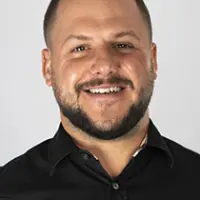
Joseph Toland
COO
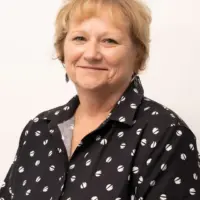
Cathy Claud
Chief Administrative Officer
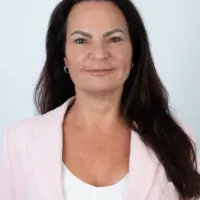
Dr. Alison Tarlow, Psy.D
CCO

Alex Cuevas, BS
CFO

Stephanie Morris, RN
Chief Nursing Officer
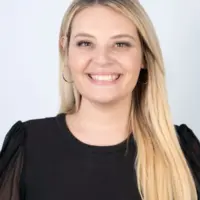
Samantha Gorson
Director of Human Resources
Accreditations

LegitScript has reviewed Boca Recovery Center – Bloomington Alcohol & Drug Rehab as part of their certification program, and has determined that it meets the LegitScript standards for legality, safety and transparency.
LegitScript verified in

The Joint Commission, formerly known as JCAHO, is a nonprofit organization that accredits rehab organizations and programs. Founded in 1951, the Joint Commision's mission is to improve the quality of patient care and demonstrating the quality of patient care.
Joint Commission Accreditation: Yes

The Substance Abuse and Mental Health Services Administration (SAMHSA) is a branch of the U.S. Department of Health and Human Services. Established in 1992 by congress, SAMHSA's mission is to reduce the impact of substance abuse and mental illness on American's communities.
SAMHSA Listed: Yes

State Licenses are permits issued by government agencies that allow rehab organizations to conduct business legally within a certain geographical area. Typically, the kind of program a rehab facility offers, along with its physical location, determines which licenses are required to operate legally.
State License: Indiana

